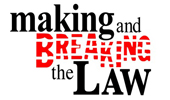By Dr. Haley Duschinski
College of Arts & Sciences faculty are tackling the challenges of the 21st century by building interdisciplinary and team-taught courses around a new set of curricular themes.
The Center for Law, Justice & Culture has developed a new interdisciplinary thematic track, Making and Breaking the Law, that focuses on law and justice in relation to citizenship, global affairs, human rights, public health, and science and technology.
 The dominant global forces that have defined the 21st century—globalization, technological revolutions, international human rights movements, neoliberal capitalism and its crises, the national security framework of never-ending war—have massively transformed law and legal frameworks, at both local and global levels.
The dominant global forces that have defined the 21st century—globalization, technological revolutions, international human rights movements, neoliberal capitalism and its crises, the national security framework of never-ending war—have massively transformed law and legal frameworks, at both local and global levels.
Courses in Making and Breaking the Law examine questions about the work of law and justice at this critical historical juncture. What is the role of law in contemporary human societies, and how did this role develop across history? How do states assert power and enact violence through law, and how are these enactments resisted, challenged, and overcome? What does justice mean in relation to citizenship, political dissent, and political discourse in the U.S.? In relation to international human rights regimes and post-conflict justice mechanisms? In relation to global disparities in access to health care and other basic human goods? How are our understandings of our own bodies, lives, and futures shaped by law? What are the limits of legal intervention in human life, and what happens when those limits are transgressed?
In other words, what are the possibilities of law and justice in this new global era?
Making and Breaking the Law leads students at all levels to grapple with these questions about the complexities of law and justice at a moment of intensified globalization, technological innovation, and political and economic interdependency. It is designed to meet the following objectives:
- It addresses major challenges of the 21st century.
- It incorporates interdisciplinary perspectives from the social sciences, natural sciences, and humanities.
- It provides thematic coherence to a cluster of General Education and College of Arts & Sciences Distribution Requirement courses.
- It includes innovative and interdisciplinary first-year seminars and culminating (capstone) courses.
Courses and Mapping
The thematic track provides a way for students to map their academic trajectory, from freshman to senior year. As they pursue the track, they first break down their assumptions about the naturalness and inevitability of the law, then consider a range of questions about law and justice, and ultimately explore ways of remaking the law in their disciplinary areas of expertise.
- The First Year Seminar: Breaking the Law is an innovative seminar course offered to incoming freshmen each fall by a rotating team of A&S faculty. The seminar will be linked to LJC learning communities as well as LJC-themed writing course that fulfills the Tier I composition requirement.
- A&S Distribution Courses include existing upper-level courses related to the theme of law, justice and culture, so that students can fulfill their A&S Distribution Requirements in ways that are thematically coherent. These include experiential learning opportunities that relate to law and justice, such as such as externships, study abroad and domestic travel programs, and research projects for course credit.
- Beyond the Classroom: The theme features events and activities “beyond the classroom” to enhance the intellectual community of students and faculty who share a common interest in law, justice, and culture. Such events include public lectures, scholars and artists in residence, film series, workshops, and reading groups.
- Culminating Courses: Remaking the Law: include existing and new T3 and T3E courses in various departments that provide opportunities for students to revisit the LJC theme and put their skills and knowledge into practice. These problem-based and project-oriented courses will provide opportunities for students to explore ways of “remaking” the law in specific major programs.
The thematic track is supported by the Center for Law, Justice & Culture, a scholarly community dedicated to exploring law’s formative role in social and political life, in domestic contexts as well as global arenas. The center’s law-related resources, projects, and initiatives provide a vibrant and supportive environment for faculty, students, and alumni who are committed to this interdisciplinary project.
The theme curriculum committee for Making and Breaking the Law includes Kathleen Sullivan (Political Science), Kevin Uhalde (History), Bruce Hoffman (Sociology-Criminology) and Haley Duschinski (Anthropology).
Dr. Haley Duschinski is Director, Center for Law, Justice & Culture and Associate Professor, Department of Sociology & Anthropology.



















Comments